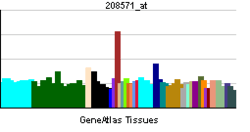ANP32D
| Acidic (leucine-rich) nuclear phosphoprotein 32 family, member D | |||||||||
|---|---|---|---|---|---|---|---|---|---|
| Identifiers | |||||||||
| Symbols | ANP32D ; PP32R2 | ||||||||
| External IDs | OMIM: 606878 GeneCards: ANP32D Gene | ||||||||
| |||||||||
| RNA expression pattern | |||||||||
 | |||||||||
| More reference expression data | |||||||||
| Orthologs | |||||||||
| Species | Human | Mouse | |||||||
| Entrez | 23519 | n/a | |||||||
| Ensembl | ENSG00000139223 | n/a | |||||||
| UniProt | O95626 | n/a | |||||||
| RefSeq (mRNA) | NM_012404 | n/a | |||||||
| RefSeq (protein) | NP_036536 | n/a | |||||||
| Location (UCSC) | Chr 12: 48.87 – 48.87 Mb | n/a | |||||||
| PubMed search | n/a | ||||||||
Acidic leucine-rich nuclear phosphoprotein 32 family member D is a protein that in humans is encoded by the ANP32D gene.[1][2][3]
Phosphoprotein 32 (PP32) is a tumor suppressor that can inhibit several types of cancers, including prostate and breast cancers. The protein encoded by this gene is one of at least two proteins that are similar in amino acid sequence to PP32 and are part of the same acidic nuclear phosphoprotein gene family. However, unlike PP32, the encoded protein is tumorigenic. The tumor suppressor function of PP32 has been localized to a 25 amino acid region that is absent in the protein encoded by this gene. This gene does not contain introns.[3]
See also
References
- ↑ Kadkol SS, Brody JR, Pevsner J, Bai J, Pasternack GR (Apr 1999). "Modulation of oncogenic potential by alternative gene use in human prostate cancer". Nat Med 5 (3): 275–9. doi:10.1038/6488. PMID 10086381.
- ↑ Brody JR, Kadkol SS, Mahmoud MA, Rebel JM, Pasternack GR (Aug 1999). "Identification of sequences required for inhibition of oncogene-mediated transformation by pp32". J Biol Chem 274 (29): 20053–5. doi:10.1074/jbc.274.29.20053. PMID 10400610.
- ↑ 3.0 3.1 "Entrez Gene: ANP32D acidic (leucine-rich) nuclear phosphoprotein 32 family, member D".
Further reading
- Matilla A, Radrizzani M (2005). "The Anp32 family of proteins containing leucine-rich repeats". Cerebellum 4 (1): 7–18. doi:10.1080/14734220410019020. PMID 15895553.
- Gerhard DS, Wagner L, Feingold EA et al. (2004). "The status, quality, and expansion of the NIH full-length cDNA project: the Mammalian Gene Collection (MGC)". Genome Res. 14 (10B): 2121–7. doi:10.1101/gr.2596504. PMC 528928. PMID 15489334.
- Strausberg RL, Feingold EA, Grouse LH et al. (2003). "Generation and initial analysis of more than 15,000 full-length human and mouse cDNA sequences". Proc. Natl. Acad. Sci. U.S.A. 99 (26): 16899–903. doi:10.1073/pnas.242603899. PMC 139241. PMID 12477932.
- Kadkol SS, El Naga GA, Brody JR et al. (2002). "Expression of pp32 gene family members in breast cancer". Breast Cancer Res. Treat. 68 (1): 65–73. doi:10.1023/A:1017919507109. PMID 11678310.
- Bai J, Brody JR, Kadkol SS, Pasternack GR (2001). "Tumor suppression and potentiation by manipulation of pp32 expression". Oncogene 20 (17): 2153–60. doi:10.1038/sj.onc.1204294. PMID 11360199.
- Kadkol SS, Brody JR, Pevsner J et al. (1999). "Correction to "Modulation of oncogenic potential by alternative gene use in human prostate cancer"". Nat. Med. 5 (9): 1087. doi:10.1038/12530. PMID 10471270.